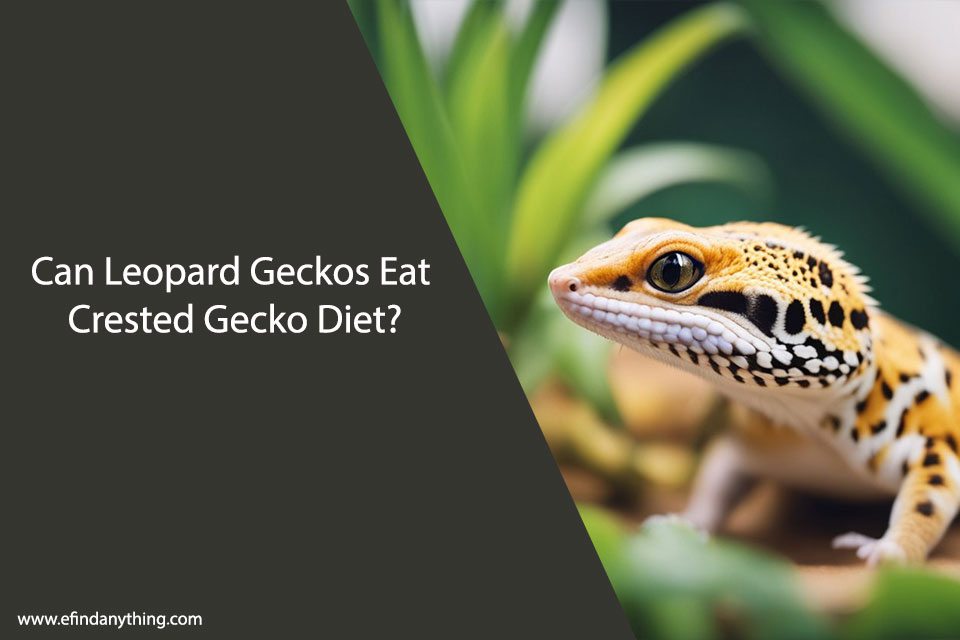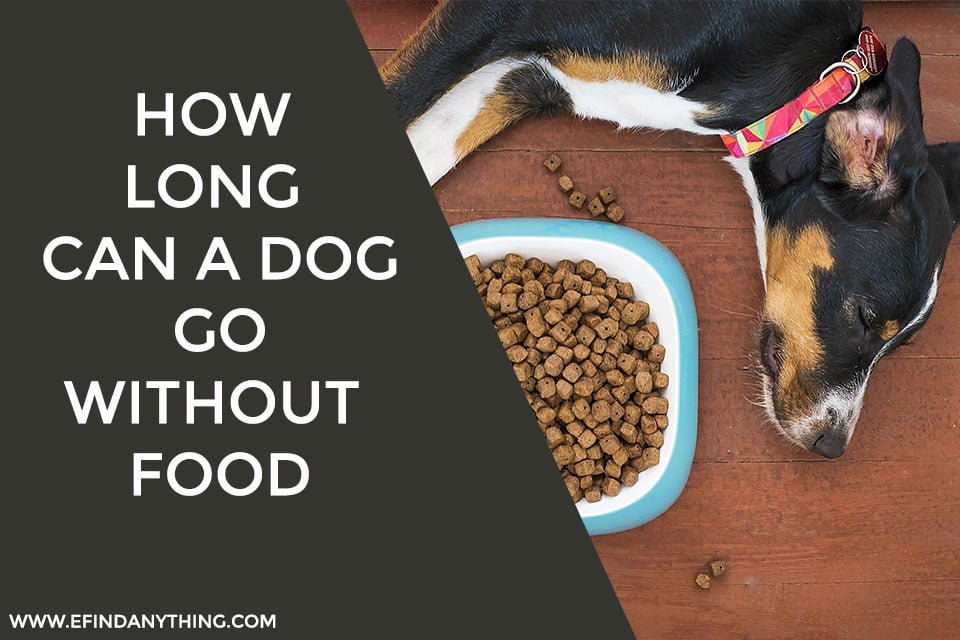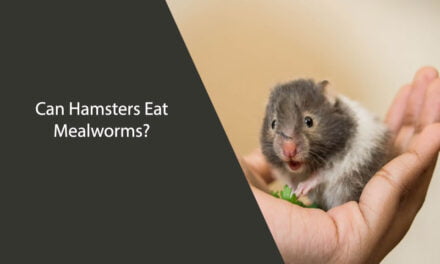Leopard geckos are one of the most popular pet reptiles due to their ease of care and unique personalities. As a result, many people are curious about what they can feed their leopard geckos to keep them healthy and happy. One question that often arises is whether leopard geckos can eat crested gecko diet.
Crested gecko diet is a popular commercial food for crested geckos that is made from a blend of fruits, insects, and other ingredients. While it is formulated specifically for crested geckos, some people wonder if it can be used as a food source for other reptiles, including leopard geckos. In this article, we will explore whether leopard geckos can safely consume crested gecko diet and what factors to consider before doing so.
Before we dive into the topic, it is important to note that leopard geckos are strict carnivores and require a diet that is high in protein and low in fat. While they may occasionally eat fruits or vegetables in the wild, these should not make up a significant portion of their diet in captivity. With this in mind, let’s examine whether crested gecko diet is a suitable food source for leopard geckos.
Table of Contents
Dietary Requirements of Leopard Geckos

As responsible pet owners, we want to ensure that our leopard geckos are getting the proper nutrition they need to stay healthy and happy. In the wild, leopard geckos are insectivores, meaning they primarily eat insects. As such, a diet consisting of insects is the most appropriate for them.
Leopard geckos require a balanced diet that includes a variety of insects, as well as calcium and other essential vitamins and minerals. Some of the insects that are suitable for leopard geckos include crickets, mealworms, waxworms, and superworms. It is important to feed them a variety of insects to ensure they are getting a balanced diet.
In addition to insects, leopard geckos also require calcium to support healthy bone growth. Calcium can be provided in the form of calcium powder, which can be sprinkled on their food. It is important to note that too much calcium can be harmful, so it is essential to follow the recommended dosage.
While it may be tempting to offer your leopard gecko other types of food, such as fruits or vegetables, it is important to remember that they are not part of their natural diet and may not provide the necessary nutrients. Additionally, it is important to avoid feeding your leopard gecko wild-caught insects, as they may contain harmful pesticides or parasites.
Overall, a balanced diet consisting of a variety of insects and calcium powder is essential for the health and well-being of leopard geckos. By providing them with the proper nutrition, we can help ensure they live long and healthy lives.
Nutritional Composition of Crested Gecko Diet

Crested Gecko Diet is a commercially available food specifically formulated for crested geckos, but some leopard gecko owners may wonder if it is suitable for their pets as well.
This diet typically contains a blend of fruits, insects, and other ingredients that provide a balanced diet for crested geckos. The exact composition of crested gecko diet can vary between brands, but most will contain a combination of the following:
- Protein: typically derived from insects like crickets and mealworms, as well as plant-based sources like soy protein isolate
- Carbohydrates: often provided by fruits like mango, papaya, and banana
- Fat: usually from sources like soybean oil and coconut oil
- Vitamins and minerals: added to ensure a complete and balanced diet
It is important to note that while crested gecko diet may be nutritionally complete for crested geckos, it may not provide all of the nutrients that leopard geckos require. Leopard geckos are insectivores and require a diet primarily made up of insects, with occasional supplementation of fruits and vegetables.
Therefore, while crested gecko diet can be a useful supplement or occasional treat for leopard geckos, it should not be relied upon as a sole source of nutrition. It is always best to consult with a veterinarian or reptile nutrition expert to ensure that your pet is receiving a balanced and appropriate diet.
Risks of Feeding Crested Gecko Diet to Leopard Geckos
When it comes to feeding leopard geckos, it is important to provide them with a balanced diet that meets their nutritional requirements. While it may be tempting to feed them the same diet as other gecko species, such as crested geckos, this can pose some risks. In this section, we will discuss the potential risks of feeding crested gecko diet to leopard geckos.
Nutritional Imbalances
Crested gecko diet is formulated specifically for crested geckos and may not provide all the necessary nutrients that leopard geckos require. For instance, crested gecko diet is high in fruit and low in insects, which may not meet the protein and fat requirements of leopard geckos. Additionally, crested gecko diet may contain high levels of vitamin D3, which can be toxic to leopard geckos if consumed in excess.
Potential Health Issues
Feeding crested gecko diet to leopard geckos can lead to various health issues. For example, the high fruit content in crested gecko diet can cause digestive problems in leopard geckos, leading to diarrhea and other gastrointestinal issues. Moreover, the high levels of vitamin D3 in crested gecko diet can lead to hypercalcemia, a condition in which there is an excess of calcium in the blood, which can cause kidney damage and other health problems.
In conclusion, while crested gecko diet may seem like a convenient option for feeding leopard geckos, it is important to consider the potential risks. Providing a balanced diet that meets the specific nutritional requirements of leopard geckos is essential to ensuring their health and well-being.
Appropriate Diet for Leopard Geckos

Leopard geckos are insectivores, and their diet should consist mainly of live prey. They require a balanced diet that provides them with all the essential nutrients, vitamins, and minerals they need to stay healthy and thrive. In this section, we will discuss the appropriate diet for leopard geckos, including live prey, supplements, and vitamins.
Live Prey
Leopard geckos should be fed a variety of live prey, including crickets, mealworms, superworms, and dubia roaches. It is essential to provide appropriately sized prey that is not too big for the gecko to swallow. The size of the prey should be no bigger than the width of the gecko’s head.
It is recommended to dust the prey with calcium and vitamin D3 supplements before feeding them to the gecko. This will ensure that the gecko is getting the essential nutrients it needs to maintain healthy bones and prevent metabolic bone disease.
Supplements and Vitamins
Leopard geckos require supplements and vitamins to ensure they are getting all the necessary nutrients they need. Calcium and vitamin D3 supplements should be dusted on the live prey before feeding them to the gecko. This will help prevent metabolic bone disease, which is a common health issue in leopard geckos.
In addition to calcium and vitamin D3, leopard geckos also require a multivitamin supplement. This will provide them with all the necessary vitamins and minerals they need for optimal health. It is recommended to dust the live prey with a multivitamin supplement once a week.
In conclusion, leopard geckos require a balanced diet that consists mainly of live prey. It is essential to provide them with appropriately sized prey and to dust it with calcium, vitamin D3, and multivitamin supplements. By following these guidelines, you can ensure that your leopard gecko stays healthy and happy.
Alternatives to Crested Gecko Diet for Leopard Geckos
While crested gecko diet can be a convenient option for feeding leopard geckos, there are also some alternatives that can provide a balanced and nutritious diet. Here are some options to consider:
Insects
Leopard geckos are insectivores, so feeding them a variety of insects can provide them with the nutrients they need. Some good options include crickets, mealworms, waxworms, and superworms. It’s important to gut-load the insects before feeding them to your gecko, which means feeding them a nutritious diet for 24-48 hours before feeding them to your gecko.
Commercial Gecko Diets
There are also commercial gecko diets available that are specifically formulated for leopard geckos. These diets typically come in a powdered form that you mix with water to create a paste. Some popular brands include Repashy and Pangea.
Homemade Diets
If you prefer to make your own gecko food, there are plenty of recipes available online. A basic recipe might include ground turkey, sweet potato, carrot, and calcium powder. It’s important to ensure that the recipe provides a balanced diet and includes all of the necessary nutrients.
Overall, there are several alternatives to crested gecko diet that can provide a nutritious diet for your leopard gecko. It’s important to do your research and choose a diet that meets your gecko’s specific nutritional needs.
Feeding Frequency and Quantity for Leopard Geckos
When it comes to feeding leopard geckos, it’s important to find the right balance between providing enough nutrition and avoiding overfeeding. We recommend feeding adult leopard geckos once every two to three days, while juveniles should be fed daily.
It’s also important to pay attention to the quantity of food being offered. The amount of food offered should be no larger than the size of the gecko’s head. Overfeeding can lead to obesity and health problems, so it’s crucial to monitor the amount of food being consumed.
Leopard geckos are insectivores, and their diet should consist primarily of insects. We recommend offering a variety of insects, such as crickets, mealworms, and dubia roaches, to ensure a balanced diet. It’s also important to gut-load the insects with nutritious foods before feeding them to the geckos.
In addition to insects, leopard geckos can also be offered occasional treats such as pinkie mice or waxworms. However, these should be given sparingly and not as a regular part of their diet.
Overall, providing a balanced and varied diet, while monitoring feeding frequency and quantity, is crucial for the health and well-being of leopard geckos.
Understanding Reptile Nutrition

When it comes to feeding our reptiles, it’s important to understand their nutritional needs. Reptiles require a balanced diet that includes protein, fat, carbohydrates, vitamins, and minerals.
Different species of reptiles have different dietary requirements, so it’s important to do research on what your specific reptile needs. For example, leopard geckos are insectivores and require a diet high in protein, while crested geckos are omnivores and require a diet that includes both insects and fruit.
One popular option for feeding crested geckos is crested gecko diet, which is a powdered food that can be mixed with water to form a paste. While crested gecko diet is formulated specifically for crested geckos, it may not be suitable for other species of reptiles, such as leopard geckos.
Leopard geckos require a diet that is high in insects, such as crickets, mealworms, and dubia roaches. While it may be tempting to feed them crested gecko diet as a supplement, it’s important to remember that this food is not formulated for their specific nutritional needs.
In conclusion, understanding reptile nutrition is crucial for providing our pets with a healthy and balanced diet. While crested gecko diet may be a suitable option for crested geckos, it’s important to research and provide species-specific diets for our reptiles.
Frequently Asked Questions
What are the primary dietary requirements of leopard geckos?
Leopard geckos are insectivores and require a diet that is high in protein. They primarily eat crickets, mealworms, waxworms, and other insects. It is important to ensure that the insects are properly gut-loaded with a nutritious diet before feeding them to your leopard gecko.
Are there any risks associated with feeding crested gecko diet to leopard geckos?
Crested gecko diet is not recommended for leopard geckos. Although it may contain some of the nutrients that leopard geckos need, it is not formulated to meet their specific dietary requirements. Feeding crested gecko diet to leopard geckos may lead to nutritional deficiencies and other health problems.
What are common food items that should be avoided in a leopard gecko’s diet?
Leopard geckos should not be fed with food items that are too large for them to swallow or digest properly. They should also avoid feeding them with insects that have hard exoskeletons, such as beetles, as they may cause impaction. Additionally, mealworms should be given in moderation as they have a hard exoskeleton and can cause impaction if fed in excess.
What is the ideal nutritional plan for maintaining a healthy leopard gecko?
A healthy diet for leopard geckos should consist of a variety of insects that are properly gut-loaded with nutritious foods. It is also important to dust the insects with a calcium and vitamin D3 supplement to ensure that they are receiving the necessary nutrients for healthy bone growth and development.
Which insects are considered safe and nutritious for leopard geckos to consume?
Crickets, mealworms, waxworms, and dubia roaches are all safe and nutritious insects for leopard geckos to consume. They should be gut-loaded with nutritious foods and dusted with a calcium and vitamin D3 supplement before feeding them to your leopard gecko.
Can other reptile-specific diets be safely offered to leopard geckos?
No, other reptile-specific diets are not recommended for leopard geckos. They are formulated to meet the specific dietary requirements of other reptiles and may not provide the necessary nutrients for leopard geckos. It is important to feed leopard geckos with a diet that is specifically formulated for their nutritional needs.





